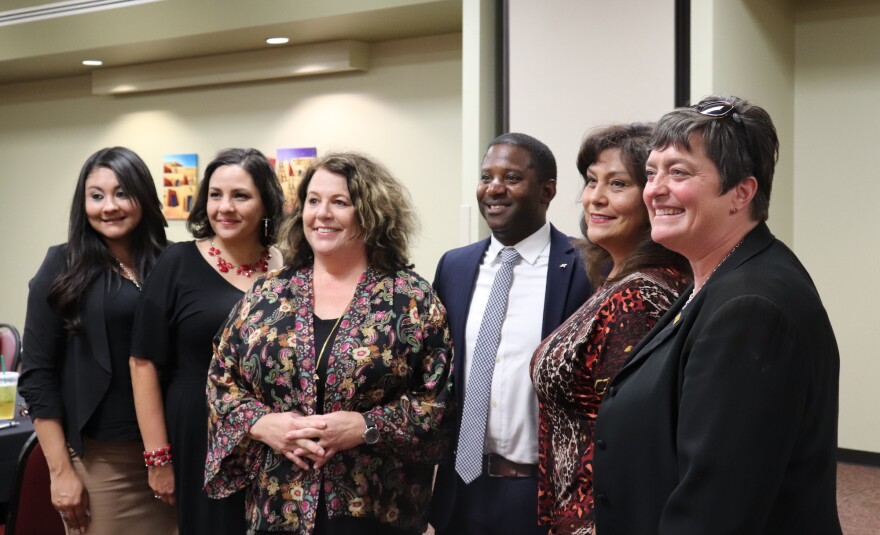As New Mexico students settle back into the classroom, the Public Education Department is getting a new leader. Dr. Ryan Stewart was hired just a few weeks after Gov. Michelle Lujan Grisham fired her first education secretary. Stewart spent time visiting schools Tuesday, and he sat down with a couple dozen educators to hear their biggest concerns.
"I am a proud eighth grade math and science teacher, focused primarily on algebra and physical science, as well as English language development," Stewart said as he sat in a conference room at the Indian Pueblo Cultural Center and gave a rundown of his resume: several years teaching English Language Learners and mentoring teachers in California, graduate studies in education at Harvard, an administrative position at the School District of Philadelphia.
In Philadelphia, he said, he was "getting to know the ins and outs of what makes these very, very large systems tick, and how we organize to effectively try to move student outcomes from that level."
Stewart recently worked at Partners in School Innovation, a nonprofit dedicated to improving opportunities for low-income students of color. And he’ll be tasked with similar challenges in New Mexico. A district court judge ruled last year the state was failing to provide sufficient education to at-risk students, defined as English Language learners, Native American Students, students with disabilities, and low income students.
At Tuesday’s roundtable, union member and Bernalillo Elementary School teacher Genevieve Sosa said her district needs more teachers certified to provide history, language and cultural education to students from several different Pueblo communities.
"And making sure that we’re also sensitive to the caveats and nuances in every single one of those cultures," said Sosa, who grew up on the Navajo Nation in the Four Corners region, "because we have a very, very diverse community that is very individualized and very different."
Increasing support for teachers was a big theme throughout the discussion. Several people mentioned the need for more professional development and mentorship of new teachers.
Angela Reynolds is an educational diagnostician and former special education teacher. She’s concerned that occupational therapists, speech-language pathologists, social workers and other school support staff got about half the raise, percentage-wise, that classroom teachers got this year.
“It seems to tell them that they are worth less than a classroom teacher, and we all know that’s not true," said Reynolds. "We need systems that are set up to pay these professionals to want to come into this profession.”
New Mexico faces a huge shortage of school staff. Albuquerque Public Schools alone has more than four hundred positions open, many of them in special education.
Ellen Bernstein, president of the Albuquerque Teachers’ Federation, said it’s not the low pay that causes teachers to leave the profession; it's a lack of support from school administrators and disrespect for the profession overall. “We are looking to you and your deputies and this governor to change a deficit view of teachers and our students to an asset view of all of us," Bernstein said.

Teachers unions were fiercely at odds with the state under former governor Susana Martinez, whose PED in 2011 rolled out a teacher evaluation system that many educators found to be arbitrary, punitive and too heavily weighted on scores from standardized tests like PARCC.
Now, PARCC is gone, and the state has begun a redesign of teacher evaluations and student assessments.
"One of my biggest concerns is how much we over-test, particularly kindergarten," said Sonya Romero Smith, an early childhood educator for more than 17 years. "In my opinion, they're inappropriate environments we put them in, as far as sitting them in front of a computer to test and really pushing curriculum and such, as opposed to developmentally appropriate learning, play, and such."
Sec. Stewart’s philosophy, he said, is that testing should provide teachers and parents enough information to be able to identify where students are at and help them grow.
"We want to have the tests that give us the info that’s usable and that can drive instruction," said Stewart. "We also need to make sure we’re not just testing and not instructing, because that’s not what we got into this business to do and it doesn’t help."
The new president of NEA New Mexico, Mary Parr Sanchez, is a longtime middle school teacher from Las Cruces. After the event, she said she was especially glad to hear Stewart say he values innovation in schools.
“I think that he’s looking for innovative ideas, he wants to entertain those ideas and move forward with them," said Parr Sanchez. "It’s a really hopeful space right now for education in New Mexico."
Stewart, 38, will head a PED leadership of five deputy cabinet secretaries, with a starting pay of $150,000 a year. He’ll start working right away, but his appointment is subject to confirmation by the state Senate.
******
Support for KUNM’s Public Health New Mexico project comes from the W.K. Kellogg Foundation, the McCune Charitable Foundation, and from KUNM listeners like you.





